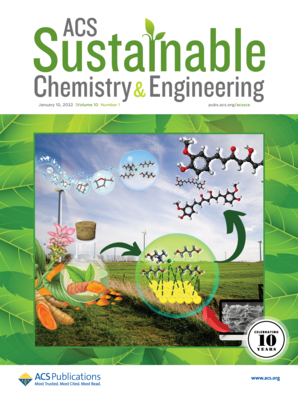植物甾醇可持续生产雄烯二酮的综合代谢工程和底物预处理
IF 7.1
1区 化学
Q1 CHEMISTRY, MULTIDISCIPLINARY
引用次数: 0
摘要
雄烯二酮(AD)是一种重要的甾体中间体,广泛用于激素类固醇药物的合成。植物甾醇高效生物转化为AD不仅可以提高其工业价值,而且可以促进可持续生物经济的发展。在本研究中,我们采用了两种策略来提高新aurum分枝杆菌(MNR)的AD产量:(i)通过删除转录因子FdmR来优化代谢通量,上调植物甾醇侧链降解途径,并过度表达icl1和sdhD,以防止代谢中间体的积累;(ii)在废食用油/HP-β-环糊精(WCO/HP-β-CD)共溶剂体系中使用高压均质(HPH)来提高植物甾醇的生物利用度。在优化条件下,工程菌株QCM3-ΔFdmR-icl1-sdhD在72 h内的AD产量为9.29 g/L,是对照菌株QCM3的1.5倍。此外,重复分批发酵的使用使生产周期缩短了46.7%,进一步提高了效率和工艺可持续性。这项工作为可持续的AD生物合成提供了新的策略,可以扩展到其他高价值类固醇中间体的生产。本文章由计算机程序翻译,如有差异,请以英文原文为准。

Integrated Metabolic Engineering and Substrate Pretreatment for Sustainable Androstenedione Production from Phytosterols
Androstenedione (AD) is a key steroidal intermediate widely used in the synthesis of hormonal steroid drugs. Efficient bioconversion of phytosterols into AD not only enhances their industrial value but also promotes the development of a sustainable bioeconomy. In this study, we employed two strategies to enhance AD production in Mycolicibacterium neoaurum (MNR): (i) optimizing metabolic flux by deleting the transcription factor FdmR to upregulate the phytosterol side-chain degradation pathway and overexpressing icl1 and sdhD to prevent the accumulation of metabolic intermediates and (ii) enhancing the bioavailability of phytosterols using high-pressure homogenization (HPH) in a waste cooking oil/HP-β-cyclodextrin (WCO/HP-β-CD) cosolvent system. Under the optimized conditions, engineered strain QCM3-ΔFdmR-icl1-sdhD produced 9.29 g/L AD in 72 h, representing a 1.5-fold increase over the control strain QCM3. In addition, the use of repetitive batch fermentation reduced the production cycle by 46.7%, further improving the efficiency and process sustainability. This work provides novel strategies for sustainable AD biosynthesis that can be extended to the production of other high-value steroid intermediates.
求助全文
通过发布文献求助,成功后即可免费获取论文全文。
去求助
来源期刊

ACS Sustainable Chemistry & Engineering
CHEMISTRY, MULTIDISCIPLINARY-ENGINEERING, CHEMICAL
CiteScore
13.80
自引率
4.80%
发文量
1470
审稿时长
1.7 months
期刊介绍:
ACS Sustainable Chemistry & Engineering is a prestigious weekly peer-reviewed scientific journal published by the American Chemical Society. Dedicated to advancing the principles of green chemistry and green engineering, it covers a wide array of research topics including green chemistry, green engineering, biomass, alternative energy, and life cycle assessment.
The journal welcomes submissions in various formats, including Letters, Articles, Features, and Perspectives (Reviews), that address the challenges of sustainability in the chemical enterprise and contribute to the advancement of sustainable practices. Join us in shaping the future of sustainable chemistry and engineering.
 求助内容:
求助内容: 应助结果提醒方式:
应助结果提醒方式:


